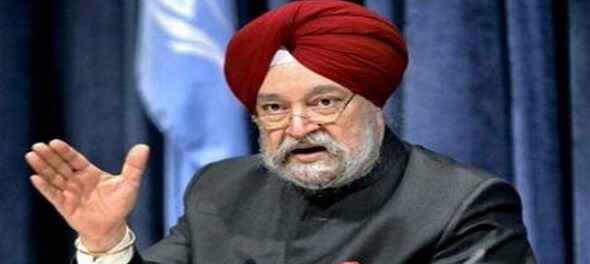
Union Minister for Petroleum and Natural Gas, Hardeep Singh Puri, on Wednesday (October 11) highlighted that the sensitivity of importing countries, especially large buyers, has to be taken into account.
Speaking at the 14th edition of KPMG’s Innovation and Energy Conclave, Puri said many important oil-producing countries are showing worrying signs, and availability and affordability of oil needs to be looked at.
Puri's statement comes as key OPEC+ members Saudi Arabia and Russia have continued with their policy of voluntary cuts. Saudi Arabia announced last week that it would continue with a voluntary cut of one million barrels per day (bpd) until the end of 2023, while Russia said it would keep a 3,00,000 bpd voluntary export curb until the end of December.
This resulted in oil jumping towards $100 a barrel for Brent crude, the highest since 2022. This led to the oil minister assuring that India would be able to manage oil prices above $100 per barrel, but it could lead to "organised chaos".
"India's energy demand will continue to provide fuel for future economic growth, as it grows exponentially: India is the world's 3rd largest consumer of oil, 3rd largest LPG consumer, 4th largest LNG importer, 4th largest refiner, 4th largest automobile market," he observed.
"My belief is if you have a large amount of liquidity then high oil prices mean a problem."
Puri on Israel-Hamas conflict
Puri remained hopeful that India can navigate through the ongoing West Asian crisis if the oil supply lines were not disrupted. As per him, the union government has maintained a close watch on the situation.
"I think in the 5 days of the Hamas strikes and Israel’s military operations which look like getting escalated, I think the global markets will factor all things into account and if the supply lines are not disrupted, hopefully we will be able to navigate through."
"If crude oil prices go up it has a very strong and adverse impact on efforts for global economic recovery," he added.
Puri also said at the conclave that the world is facing multiple crises at the moment, including in the food, fuel and fertiliser sectors.
“The world of energy is riddled with challenges on multiple fronts–increasing population, dwindling resources, environmental degradation, rising food and energy prices. The global energy trilemma challenge – security, affordability and sustainability, needs a nuanced approach especially taking the needs of the global south into consideration.”
The situation in West Asia remains tense as Israel continues to conduct airstrikes in the Hamas-controlled Gaza Strip to avenge the Saturday invasion.
Meanwhile, the possibility of a ground invasion remains high as Israel amasses over 3,00,000 troops near the Gaza border. Local media have reported PM Benjamin Netanyahu informing the US and Egyptian authorities about the possibility of conflict running for months.
Meanwhile, the possibility of a widening conflict remains high as Lebanon-based Hezbollah continues to fire small rockets into Northern Israel, showing solidarity with their "Gazan brothers".
'Close to achieving 20% ethanol blending'
Puri announced that India will soon achieve its target of 20% ethanol blending, much earlier than the set target. "Very close to achieving 20% ethanol blending, it’s within sight," Puri said.
The government has set the target of achieving a remarkable 20% ethanol blending program by the year 2025. At present, the petrol available to consumers for use is mixed with only 10% ethanol.
Earlier this year, PM Narendra Modi rolled out 20% ethanol-blended petrol in select gas stations in 11 States and Union Territories (UT). The advantages cited for this move include reduced emissions and fewer foreign exchange-draining imports.
First Published: Oct 11, 2023 4:34 PM IST
Check out our in-depth Market Coverage, Business News & get real-time Stock Market Updates on CNBC-TV18. Also, Watch our channels CNBC-TV18, CNBC Awaaz and CNBC Bajar Live on-the-go!


BJP's Hindi heartland dominance faces test in phase 3 polls
May 2, 2024 9:14 PM
Lok Sabha Election: Re-elections at a Ajmer booth after presiding officer misplaces register of voters
May 2, 2024 4:54 PM

